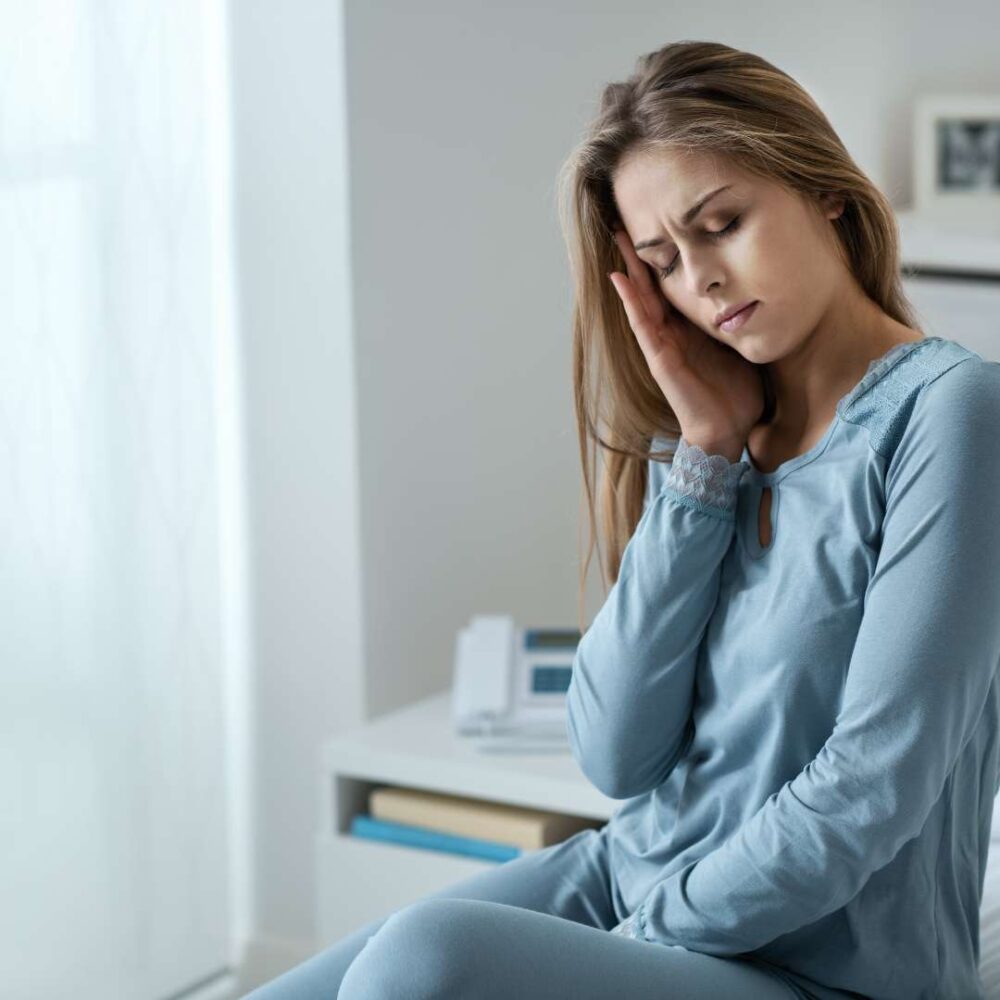
You wake up in the morning, already a knot in the stomach from anxiety about what could go wrong, what you forgot to do, or what your partner said the other night. This anxiety first thing in the morning has been reoccurring for a while now, and you've sort of become used to it.
I remember this one time when I was swamped with deadlines at work. Right at that moment, I could literally feel the anxiousness creeping in. My chest felt tight, my thoughts were racing, and I just couldn't sit still. I bet you have experienced these feelings at some point in your life whether at work too, at school, or even in any circumstances in your everyday life. It usually happens when stress seems never-ending.Now you know how stress can become an anxiety disorder if left alone long enough.
So, let's talk about anxiety and stress. Are they the same thing, or are they completely different? In this article, let's deep dive on how anxiety and stress are connected. Plus, I'll throw in some helpful tips on how to manage both, so you can feel more at ease. Let's dive in, shall we?
Article Highlight:
- Basically, anxiousness is a natural response when our body releases stress hormones. It's like feeling nervous before a job interview. Or being fearful when a big test is coming. Did you know that healthy levels can actually help us stay alert and focused in certain situations? Sadly, when anxiety becomes so severe or chronic, they can lead to an anxiety disorder or other mental illness.
- Now, about stress. It's our body's reaction to external pressures. Stress may be triggered by things like work deadlines or relationship conflicts. Chronic stress, it can lead to anxiety. Unfortunately, it can create a cycle of worry and tension that may affect our day to day life.
- Whenever you feel stressed or anxious, mindfulness and relaxation techniques, as well as lifestyle changes can make a big difference in relieving stress or anxiety and improving our mental health.
- For some people, they may find relief from anxiety and stress by exploring the benefits of natural supplements like CBDA. For starters, it is a non-psychoactive compound that may promote relaxation and reduce inflammation-related anxiety. But make sure to always do your research and consider various options to find what works best for you.
Understanding Anxiety and Stress
Pause for a moment and remember the sensation you feel whenever you feel overwhelmed and stressed.
There's this feeling of fear about something that's yet to happen.
What's worse is we may be worried about an impending doom that might not even happen. I've been there. I'm sure you have too. And that's where I've come to learn that it's important for us to understand the relationship between anxiety and stress. This is so we can manage them effectively.
Anxiety vs. Stress: What's the Difference?
Anxiety and stress might be the same thing when you first look at it. I used to think that way too. However, it turns out stress is actually very different from anxiety.
So you know, anxiety is our natural response to stress. It's that feeling of fear or apprehension to a perceived threat. Also, it can be rooted in traumatic events. I remember when I was about to give a presentation in front of a large audience and it was my greatest weakness. Right there, I felt my heart racing and my hands shaking. If you have experienced that, then you know that’s anxiety.
On the other hand, stress is our physical and emotional response. These responses are triggered by external pressures or demands. It may be affected by various factors like your work or education, family, or financial issues. I recall when I was juggling multiple deadlines, I felt overwhelmed and had tension rising up my chest. If you can relate to that feeling, that's stress.
So, while anxiety is a feeling of fear or apprehension, stress is a physical and emotional response to external pressures or demands. When we are able to recognize these differences we can better be equipped in effective management to alleviate stress or anxiety.
How Stress Can Lead to Anxiety
When stress or anxiety hits, it's not fun, and often debilitating.
This is especially true when stress becomes a constant companion. Chronic stress can actually trigger anxiety which then may lead to an anxiety disorder.
Anxiety disorders can be a panic disorder, or generalized anxiety disorder, or it can be social anxiety disorder. A lot of disorders just because of stress, huh? Anxiety can even lead to depression.
That is why dealing with stress is crucial to take care of our mental health. But before anything else, let me help you understand how stress happens.
The Biology Behind Stress and Anxiety
Picture this: you're right in the middle of a stressful situation. When this happens, your body can go into "action mode" and release stress hormones like cortisol and adrenaline. These hormones actually deal with the stressor.
You know what? This response can be super helpful in the short term.
Our ancient bodies evolved a stress response to immediate, is that a lion in the bush? Your senses are heightened, as your ancestors ready to spring into action from the release of those immediate hormones and nervous system signals.
A successful hunt or escaping a threat could mean the difference between life and death. After, your body calms down, your hormones are back to normal, and life goes on.
Is this how you feel after a long day at work, another thing on the internet that you need to be outraged at, or your kids are sick again and need to stay home from school?
Where is your stress reset?
If stress lasts long, our stress response can go into haywire. This can lead to physical symptoms like a pounding heart, chest pain, sweating, and tense muscles, and digestive issues. It can even manifest in psychological symptoms like irritability and trouble focusing.
The Psychology of Stress and Anxiety
Long term stress can mess with our mental health and trigger anxious thoughts and feelings. When you are stressed, you might feel like you're losing control and you might be worried about what the future holds.
Unfortunately, these feelings will only lead to, well, more worrying and overthinking. This can only make anxiety symptoms worse.
Physical symptoms of stress and excessive anxiety
Do you know what long term stress and anxiety can do to our bodies?
- Weight gain: long term elevation of stress hormones can lead to changes in metabolism which cause us to put on excess fat.
- Cardiomyopathies: chronic stress can lead to heart disease since it induces release and production of inflammatory cytokines and free radicals.
- Accelerated aging: A wide body of literature is establishing a strong link between chronic stress and premature aging.
- Hair loss: chronic anxiety causes hair loss in some people through changes in their cortisol levels.
If these do not get your attention, I dont know what will! They certainly got me thinking of how to deal with stress and anxiety now.
Coping with Anxiety and Stress: Techniques and Strategies
Life can be full of stress and anxiety. If we can eliminate stress completely, but sadly, we can't.
What we can do is learn to cope with it in healthy and effective ways. In this friendly and conversational discussion, we'll explore some techniques and strategies for managing stress and anxiety.
1. Mindfulness Practices
Did you know that mindfulness is a fantastic way for you to manage stress and anxiety. It's all about being present and focusing on the here and now, without judgment.
You can practice mindfulness through meditation or deep breathing exercises. You can even just take a few minutes to really tune into your senses. When you add mindfulness to your stress and anxiety management routine, I bet you'll be better equipped to handle stress when it comes your way.
2. Relaxation Techniques
Relaxation techniques are also great for alleviating stress or anxiety. It involves progressive muscle relaxation, guided imagery, or yoga. These practices can also help you cope with the symptoms of stress and anxiety.
Relaxation techniques help to calm your body and mind. It also eases physical tension and promotes a sense of deep relaxation.
3. Cognitive-behavioral therapy (CBT)
CBT or also known as talk therapy focuses on changing the way you think. Through CBT, you can learn to identify and replace negative thought patterns with more positive ones. They are often used to treat anxiety disorders. Many clinical studies now show CBT can be effective in reducing anxiety symptoms through help with a medical professional.
Plus, it can also help you develop coping skills for managing stress and anxiety.
4. Lifestyle changes
Don't underestimate the power of making some simple lifestyle changes! They can bring a big impact in helping you reduce stress and anxiety. Regular physical activity, a healthy diet, and getting enough sleep can all contribute to better physical health and improved mental well-being.
Exercise releases endorphins, which can boost your mood and reduce stress. On the other hand, when you eat well and healthily plus get a good night's sleep, you can be at your best.
5. CBDA
The natural supplement CBDA may help with anxiety and stress by interacting with the endocannabinoid system (ECS) and serotonin receptor activation. These systems in our bodies plays a role in regulating mood, stress, and anxiety.
Although there is limited research on CBDA specifically, CBD has been shown to be beneficial for anxiety disorders and in reducing anxiety associated with specific phobias and stressful situations. As CBDA is a precursor to CBD, it is possible that it may offer similar effects.
Hemp derived CBDA is found to be 450% to over 1000% better absorbed than CBD, making it the most potent cannabinoid on the market.
Why is CBDA Great For Stress and Anxiety
CBDA is also known as cannabidiolic acid. It's a compound found in raw cannabis plants that is found safe to use since it is non-psychoactive. This means it will not get you high or cause intoxicating effects.This natural compound has gained a lot of attention for its potential therapeutic benefits on stress and anxiety. CBDA may be a great stress and anxiety buster because of its positive interaction with the body's ECS and serotonin receptors. Furthermore, this interaction helps maintain balance in the body, promoting a sense of calmness and tranquility.
Additionally, CBDA has been found to inhibit the enzyme COX-2. This enzyme is involved in the inflammatory response. Hence, CBDA can potentially reduce inflammation-related anxiety and stress. Again, more research is still yet early findings tells us it may offer a natural option for those seeking relief from these conditions.
Conclusion
So there you have it folks, now you know why it's crucial for all of us to really know how anxiety and stress are connected and as well as how they are different. This is important for us to manage both effectively. Remember, too much stress can ultimately lead to anxiety. However, there are many ways you can deal with it and prevent it from turning into a debilitating problem.Furthermore, when you know how to recognize the signs of anxiety that are caused by stress you can implement coping techniques. You can practice mindfulness, relaxation techniques, cognitive-behavioral therapy, lifestyle changes, or even add a natural supplement to your routine like CBDA. These strategies will help reduce your risk of developing anxiety disorders. Plus, you'll also be able to improve your overall well-being.
Remember, you're not alone in this journey. Seeking help from a mental health professional is crucial. Or you can find support from families and friends. This can make a significant difference in managing anxiety and stress. So, take a deep breath, you can overcome stress and anxiety.



